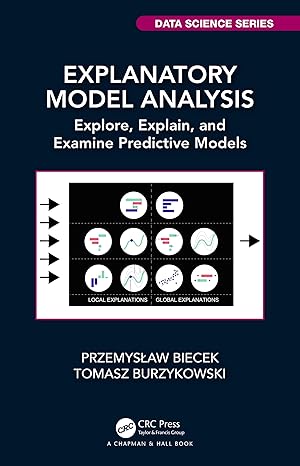
|
FreeComputerBooks.com
Links to Free Computer, Mathematics, Technical Books all over the World
|
|
- Title: Explanatory Model Analysis: Explore, Explain, and Examine Predictive Models
- Author(s): Przemyslaw Biecek and Tomasz Burzykowski
- Publisher: Chapman and Hall/CRC; (September 26, 2022); eBook (Online Edition)
- Paperback: 324 pages
- eBook: HTML
- Language: English
- ISBN-10: 0367693925
- ISBN-13: 978-0367693923
- Share This:

|
This book presents a collection of model agnostic methods that may be used for any black-box model together with real-world applications to classification and regression problems. With examples in R and Python.
About the Authors- Przemyslaw Biecek is a professor in human-oriented machine learning at the Warsaw University of Technology and Principal Data Scientist in Samsung R&D Institute Poland.
- Statistics and Mathematical Statistics
- R Programming
- Python Programming
- Data Analysis and Data Mining
- Big Data
 Similar Books:
Similar Books:
-
 Beyond Multiple Linear Regression: Linear and Multilevel Models
Beyond Multiple Linear Regression: Linear and Multilevel Models
This book is designed for undergraduate students who have successfully completed a multiple linear regression course, helping them develop an expanded modeling toolkit that includes non-normal responses and correlated structure.
-
 A First Course on Time Series Analysis with SAS (Michael Falk, et al)
A First Course on Time Series Analysis with SAS (Michael Falk, et al)
A unique feature of this book is its integration with the statistical software package SAS® (Statistical Analysis System) computing environment. Basic applied statistics is assumed through multiple regression.
-
 Statistical Inference: Algorithms, Evidence, and Data Science
Statistical Inference: Algorithms, Evidence, and Data Science
A masterful guide to how the inferential bases of classical statistics can provide a principled disciplinary frame for the data science of the twenty-first century. Every aspiring data scientist should carefully study this book, use it as a reference.
-
 Mostly Harmless Statistics (Rachel L. Webb)
Mostly Harmless Statistics (Rachel L. Webb)
This text is for an introductory level probability and statistics course with an intermediate algebra prerequisite. The focus of the text follows the American Statistical Association's Guidelines for Assessment and Instruction in Statistics Education (GAISE).
-
 Introduction to Modern Statistics (Mine Çetinkaya-Rundel, et al.)
Introduction to Modern Statistics (Mine Çetinkaya-Rundel, et al.)
This book puts a heavy emphasis on exploratory data analysis and provides a thorough discussion of simulation-based inference using randomization and bootstrapping, followed by a presentation of the related Central Limit Theorem based approaches.
-
 Foundations in Statistical Reasoning (Pete Kaslik)
Foundations in Statistical Reasoning (Pete Kaslik)
This book is designed for students taking an introductory statistics class. The emphasis throughout the entire book is on how to make decisions with only partial evidence. It focuses on the thought process.
-
 R for Data Science: Visualize, Model, Transform, Tidy, Import
R for Data Science: Visualize, Model, Transform, Tidy, Import
This book teaches you how to do data science with R: You'll learn how to get your data into R, get it into the most useful structure, transform it, visualize it and model it, how data science can help you work with the uncertainty and capture the opportunities.
-
 R Programming for Data Science (Roger D. Peng)
R Programming for Data Science (Roger D. Peng)
This book is about the fundamentals of R programming. Get started with the basics of the language, learn how to manipulate datasets, how to write functions, and how to debug and optimize code. You will have a solid foundation on data science toolbox.
-
 Efficient R Programming: Practical Guide to Smarter Programming
Efficient R Programming: Practical Guide to Smarter Programming
This book is about increasing the amount of work you can do with R in a given amount of time. It's about both computational and programmer efficiency. This book is for anyone who wants to make their use of R more reproducible, scalable, and faster.
-
 Cookbook for R: Best R Programming TIPs (Winston Chang)
Cookbook for R: Best R Programming TIPs (Winston Chang)
The goal of this cookbook is to provide solutions to common tasks and problems in analyzing data. Each recipe tackles a specific problem with a solution you can apply to your own project, and includes a discussion of how and why the recipe works.
-
 R Packages: Organize, Test, Document, and Share Your Code
R Packages: Organize, Test, Document, and Share Your Code
Turn your R code into packages that others can easily download and use. This practical book shows you how to bundle reusable R functions, sample data, and documentation together by applying author's package development philosophy.
-
 R Graphics Cookbook: Practical Recipes for Visualizing Data
R Graphics Cookbook: Practical Recipes for Visualizing Data
This cookbook provides more than 150 recipes to help scientists, engineers, programmers, and data analysts generate high-quality graphs quickly - without having to comb through all the details of R's graphing systems.





